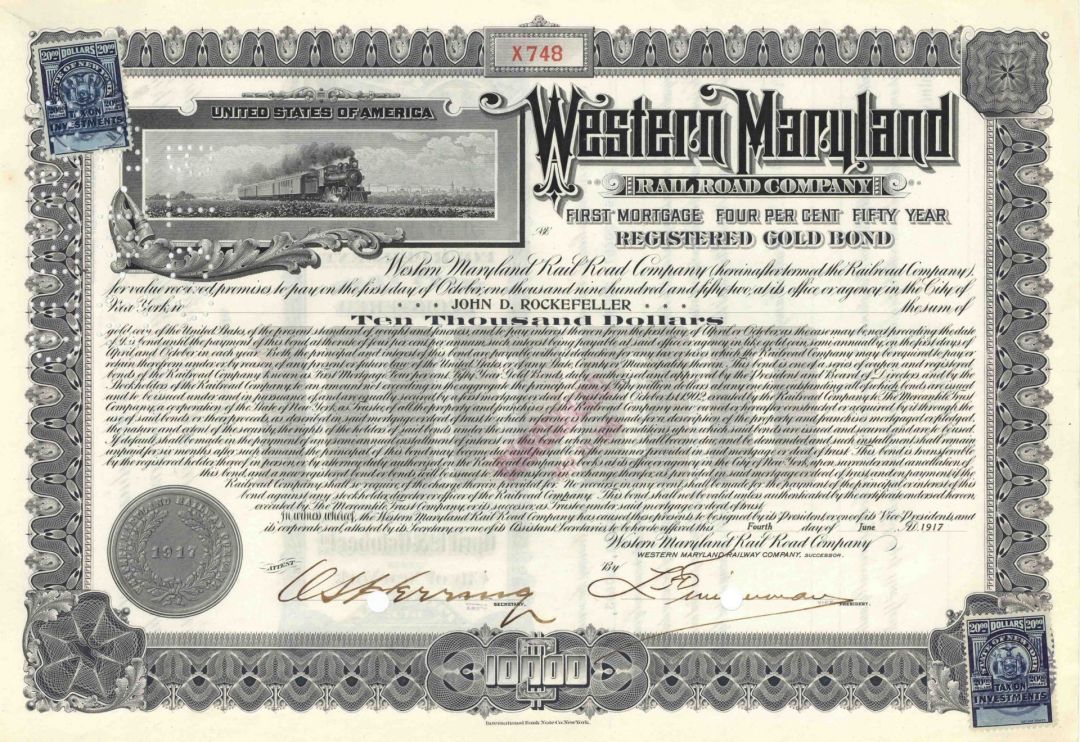Western Maryland Railroad Co. issued to John D. Rockefeller - 1917 dated $10,000 Railway Gold Bond - Not Signed
Inv# AG1071 BondJohn D. Rockefeller issued $10,000 Gold bond of the Western Maryland Railroad. Boldly issued to Rockefeller, not signed. Great graphics and quite Scarce. Includes State of New York $20 Tax on Investment Stamps.

John Davison Rockefeller Sr. (July 8, 1839 – May 23, 1937) was a prominent American entrepreneur and philanthropist. He is often regarded as the wealthiest American in history and the richest individual of the modern era. Born into a large family in upstate New York, Rockefeller's family relocated multiple times before finally establishing themselves in Cleveland, Ohio. At the age of 16, he began his career as an assistant bookkeeper and entered into various business partnerships starting at 20, with a focus on oil refining. In 1870, he established the Standard Oil Company, which he managed until 1897, remaining its largest shareholder throughout that period.
Rockefeller's fortune surged as the significance of kerosene and gasoline increased, ultimately establishing him as the wealthiest individual in the nation, with control over 90% of the oil supply in the United States at his zenith. Oil served as a primary source of illumination across the country until the advent of electricity, and it became a vital fuel following the invention of the automobile. Additionally, Rockefeller exerted considerable influence over the railroad sector, which facilitated the transportation of his oil nationwide. Standard Oil emerged as the first major business trust in the United States.
Through corporate and technological advancements, Rockefeller transformed the petroleum industry, significantly lowering production costs while ensuring widespread availability. However, his business practices faced scrutiny, notably from author Ida Tarbell.
In 1911, the Supreme Court determined that Standard Oil had to be dissolved due to breaches of federal antitrust legislation. The company was divided into 34 distinct entities, including firms that evolved into ExxonMobil, Chevron Corporation, and others, many of which continue to generate substantial revenues globally. Ultimately, it was revealed that the individual components of the company held greater value than the unified entity itself, as the shares of these segments experienced significant increases in value shortly after the breakup. As a result, Rockefeller became the first billionaire in the United States, with a fortune approximating 2% of the national economy. By 1913, his personal wealth was estimated at $900 million, representing nearly 3% of the US GDP of $39.1 billion that year. This figure marked his peak net worth, equivalent to approximately US$24.7 billion when adjusted for inflation to 2021 dollars.
Rockefeller dedicated a significant portion of the final four decades of his life to retirement at Kykuit, his estate located in Westchester County, New York. During this time, he played a pivotal role in shaping modern philanthropy, alongside other prominent industrialists such as steel tycoon Andrew Carnegie. His wealth was primarily utilized to establish a systematic and targeted approach to philanthropy through the creation of foundations that profoundly impacted medicine, education, and scientific research. His philanthropic efforts were at the forefront of advancements in medical research and were crucial in the near-eradication of diseases such as hookworm and yellow fever in the United States. Together with Carnegie, he provided direction and support to the initiatives of Abraham Flexner, whose essay "Medical Education in America" strongly advocated for empiricism as the foundation of the 20th-century American medical system.
In addition, Rockefeller was the founder of the University of Chicago and Rockefeller University, and he contributed to the establishment of Central Philippine University in the Philippines. A devout Northern Baptist, he supported numerous church-affiliated institutions and maintained a lifelong commitment to total abstinence from alcohol and tobacco. He frequently sought counsel from his wife, Laura Spelman Rockefeller, with whom he had five children. A dedicated member of the Erie Street Baptist Mission Church, he taught Sunday school and served in various capacities, including trustee, clerk, and occasional janitor. Religion was a central influence in his life, and he regarded it as a key factor in his success. Furthermore, Rockefeller was perceived as a proponent of capitalism through the lens of social Darwinism, famously stating, "The growth of a large business is merely a survival of the fittest."
A bond is a document of title for a loan. Bonds are issued, not only by businesses, but also by national, state or city governments, or other public bodies, or sometimes by individuals. Bonds are a loan to the company or other body. They are normally repayable within a stated period of time. Bonds earn interest at a fixed rate, which must usually be paid by the undertaking regardless of its financial results. A bondholder is a creditor of the undertaking.












Ebay ID: labarre_galleries